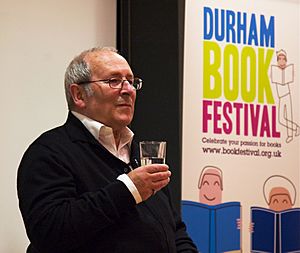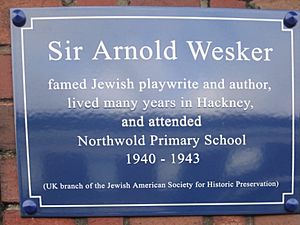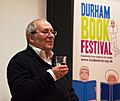Arnold Wesker facts for kids
Quick facts for kids
Sir
Arnold Wesker
FRSL
|
|
|---|---|

Wesker at the Durham Book Festival in 2008
|
|
| Born | 24 May 1932 Stepney, London, England |
| Died | 12 April 2016 (aged 83) Brighton, England |
| Occupation | Dramatist |
| Notable awards | Knight Bachelor (2006) |
Sir Arnold Wesker (born May 24, 1932 – died April 12, 2016) was a famous English dramatist, also known as a playwright. He wrote many plays, short stories, essays, and even a children's book. His works have been translated into 20 languages and performed all over the world.
Contents
Growing Up
Wesker was born in Stepney, London, in 1932. His mother, Leah, was a cook, and his father, Joseph, was a tailor's machinist and a strong supporter of communism.
Arnold Wesker's early schooling was interrupted by World War II. He was moved away from London for safety during the war. He later returned to London and went to Dean Street School during the the Blitz, when bombs were falling on the city.
He then attended Upton House Central School in Hackney. This school focused on teaching office skills like typing to bright boys who didn't go to grammar school. He was evacuated again to Llantrisant, South Wales.
Wesker was accepted into the Royal Academy of Dramatic Art, a famous acting school, but he couldn't afford to go. Later, he worked in the Royal Air Force for two years. After that, he had several jobs, including being a cook, a furniture maker, and a bookseller.
He saved enough money to study at the London School of Film Technique, which is now called the London Film School.
His Career and Famous Plays
Wesker's play The Kitchen (1957) was inspired by his time working at the Bell Hotel in Norwich. This play was later made into a film. It was at this hotel that he met his future wife, Dusty.
Wesker's plays often explored themes like finding out who you are, love, facing death, and political ideas. His play Chicken Soup with Barley (1958) first opened in Coventry, not in London's main theatre district. This showed his political views as an 'angry young man', someone who spoke out against society's problems.
Another important play was Roots (1959). It is a "kitchen sink drama," which means it shows the everyday lives of working-class people. The story is about a girl named Beatie Bryant who returns to her farming family in Norfolk after living in London. She struggles to express her own thoughts and feelings. Critics praised the play for feeling very real.
Standing Up for What He Believed In
Wesker was very involved in important social movements.
Nuclear Disarmament
In 1959, Wesker joined the Aldermaston Marches, which were protests against nuclear weapons. He was an active member of the Committee of 100. This group used peaceful protests to fight against nuclear weapons. In 1961, he was even jailed for his part in these protests.
Centre 42
After being in prison, Wesker became a leader of a new project called Centre 42. This project aimed to bring art and culture to working-class towns across Britain, not just London. It started as a traveling festival and later moved to the Roundhouse in London. The project faced money problems, and Wesker wrote about it in his play Their Very Own and Golden City (1966). The project officially ended in 1970, but the Roundhouse eventually became a permanent arts center in 2006.
Writers & Readers Publishing Cooperative
In 1974, Wesker helped start the Writers & Readers Publishing Cooperative Ltd. This was a group of writers who worked together to publish books.
Later Works
The Journalists (1972) was a play about newspaper reporters. The actors in the theatre company refused to perform it. Wesker believed it was because of political reasons. He also said he made the play's conservative politicians seem intelligent, which was not a popular idea at the time.
Wesker's play The Merchant (1976), later called Shylock, tells a story similar to Shakespeare's The Merchant of Venice. In Wesker's version, Shylock and Antonio are good friends who love books. They make a deal as a joke, not thinking it would become serious. When the deal goes wrong, Shylock feels he must follow the law to protect the Jewish community.
The play was first performed in America in 1977. The actor Zero Mostel was supposed to play Shylock but sadly passed away during rehearsals. Wesker wrote a book called The Birth of Shylock and the Death of Zero Mostel. It tells the story of making the play, including the challenges and the actor's death.
In 2005, Wesker published his first novel, Honey. It continued the story of Beatie Bryant, the main character from his play Roots.
In 2008, he released his first collection of poems, All Things Tire of Themselves. He was also a supporter of the Shakespeare Schools Festival. This charity helps school children across the UK perform Shakespeare's plays in real theatres.
His Papers and Legacy
Wesker's writings and other materials from his career are kept at the Harry Ransom Center at the University of Texas at Austin. This collection includes hundreds of boxes of his play drafts, letters, and personal records. Wesker himself helped organize his archive before it was sent there.
After his death, many people remembered his contributions. In May 2016, the BBC re-broadcast a radio program celebrating his career.
Personal Life
Arnold Wesker married Doreen Bicker in 1958. The character Beatie in his plays was inspired by Doreen. He called her "Dusty" because of her "gold-dust" hair. They had three children: Lindsay, Tanya, and Daniel. Tanya passed away in 2012. Wesker also had another daughter, Elsa, with a Swedish journalist. He was the grandfather of the Swedish rapper Yung Lean.
Sir Arnold Wesker passed away on April 12, 2016, after suffering from Parkinson's disease.
Awards and Honours
Wesker received many awards during his life.
- In 1958, he received a grant of £300 for his play Chicken Soup from the Arts Council of Great Britain. He used this money to marry Doreen.
- The next year, he won the Evening Standard Theatre Award for "Most Promising Playwright."
- He won the Italian Marzotto Prize in 1964 for Their Very Own and Golden City.
- In 1979, he won the Spanish Best Foreign Play Award.
- He became a fellow of the Royal Society of Literature in 1985.
- For his great service to theatre, he received the Last Frontier Lifetime Achievement Award in 1999.
- He was made a knight in 2006, which means he could use the title "Sir."
- In 2021, a special plaque was placed at his old primary school in Hackney, London, to remember him.
Works
Here are some of Arnold Wesker's most well-known works:
- The Kitchen, 1957
- Chicken Soup with Barley, 1958
- Roots, 1959
- Chips with Everything, 1962
- The Merchant, 1976 (also known as Shylock)
- Honey, 2005 (his first novel)
- All Things Tire of Themselves, 2008 (collection of poetry)
Images for kids
See also
 In Spanish: Arnold Wesker para niños
In Spanish: Arnold Wesker para niños




